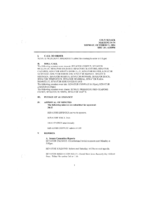Search the Special Collections and Archives Portal
Search Results

Interview with James Arnold Hodges, January 17, 2005
Date
Archival Collection
Description
Text

Meeting minutes for Consolidated Student Senate, University of Nevada, Las Vegas, October 11, 2004
Date
Archival Collection
Description
Text

Emily McKinley interview, March 1, 1981: transcript
Date
Archival Collection
Description
On March 1st, 1981, Glorialyn Gutierrez interviewed Emily McKinley (b. April 28, 1930 in Las Vegas, Nevada) about her life in the Las Vegas Valley. McKinley begins by speaking about her childhood, her siblings and her extended family. McKinley gives a variety of anecdotes about being raised in Las Vegas, her family’s economic hardships and the house she grew up in. Lastly, McKinley talks about the businesses she owned with her husband, their hardships and her time working multiple jobs.
Text

Transcript of interview with Cathie Millson by Anna Huddleston, June 10, 2014
Date
Archival Collection
Description
Cathie and Chris Millson moved to Las Vegas with their one-year-old daughter, Nicole, in 1984 following Chris’s completion of a cardio-thoracic anesthesiology fellowship in Atlanta, Georgia. Their two other children were born in Las Vegas. Shortly after they arrived they purchased the Rancho Bel Air house where they currently reside. Cathie talks about raising her children and living in Rancho Bel Air, a gated neighborhood of custom houses, which grew to maturity after the Millsons moved in. Cathie’s memories chronicle the growth of Las Vegas from small town to large city, how a certain segment of the population lived and entertained, and how downtown revitalization has brought young people back to Rancho Bel Air to raise their families.
Text

Erika Castro interview, November 12, 2018: transcript
Date
Archival Collection
Description
Interviewed by Maribel Estrada Calderón. Barbara Tabach and Laurents Banuelos-Benitez also participate in the questioning. Erika Castro was born in Mexico City in 1989. At the age of three, she migrated with her family to the United States. She remembers entering Kindergarten without knowing how to speak English. She graduated from the College of Southern Nevada. Castro has since been a political activist. Subjects: PLAN, Planned Parenthood, Environmental Justice, UndocuNetwork, Deferred Action for Childhood Arrivals, DREAM Act
Text

Francisco Rufino Parra interview, December 6, 2018: transcript
Date
Archival Collection
Description
Interviewed by Barbara Tabach. Born in Mexico, Francisco was a child when his father received permission to immigrate to the US with his younger children. Upon graduating from high school in California, he moved to Las Vegas where one of his sisters lived. It was 1994 and jobs were plentiful; he would find his way through several positions. Then in early 2000 he was hired to be a dishwasher, on the graveyard, at the recently opened Paris Hotel. It was a Culinary Union job; by 2002 he was a shop steward and finding better positions at Paris. He continues to work at the Paris Hotel as a fry cook. In 2008, he was a citizen and proudly voted in his first presidential election.
Text

Maggie Arias-Petrel interview, May 3, 2019: transcript
Date
Archival Collection
Description
Maggie Arias-Petrel is a successful businessperson and philanthropist. Born in Quito, Ecuador in 1966, Maggie grew up during the Space Age, meeting astronauts through her father’s work as a NASA engineer. Her mother worked as a teacher in an all-girls school. When she was a teenager, Maggie visited her aunt in California and decided to stay in the U.S. She eventually returned to Ecuador and helped her mother run her toy store business, helping her manage multiple locations. Her entrepreneurship flourished as she helped the family business grow into a successful enterprise. Despite the success in her home country, Maggie always dreamed of coming back and living in the U.S. When her family returned, they settled in Las Vegas in 1991. Through her entrepreneurship, Maggie helped many doctors set up their practices, and began her own consulting business, Global Professional Consulting. Today, her expertise includes over 20 years of medical practice management, marketing and advertising for medical and legal, business development and consulting experience. Maggie is also the Chairwoman of the Executive Board of Directors of the Latin Chamber of Commerce of Nevada. She is responsible for changing the direction of the Chamber and helping it become what it is today. She is also the director of the Señoras of Excellence, a philanthropic organization that focuses on raising funds to help Latino students attend college. They have awarded thousands of dollars in scholarship funds to students across the Las Vegas Valley. Because of her work in the medical field, Maggie understands the importance of affordable health care and accessibility. During the Obama Administration, she was part of Senator Harry Reid’s promotion team for the Affordable Health Care Act. She also worked with Governor Jim Gibbons doing international research work in Mexico, and was invited to the White House for the Cinco de Mayo celebration through the U.S. Hispanic Chamber and the Latino Coalition. Maggie is also responsible for the partnership between the Universidad Autónoma de Guadalajara, one of the most prestigious and accomplished institutions of higher education in Mexico, St. Rose Dominican Hospitals, and the Nevada System of Higher Education to develop nursing programs with direct collaboration from UAG to increase the number of bilingual-bicultural medical professionals in Nevada. She is the director for the Workforce Connections of Nevada Board and the Dignity HealthCare - St. Rose Dominican Hospital Board of Directors. Maggie has also received numerous accolades and awards such as the Community Service Award from the Latin Chamber of Commerce, Señoras of Excellence Award given to woman who excel in their professions, the Excellence in Advocacy Award by The Colors of Lupus Foundation, and the “Woman in Business” Award by the National Coalition of 100 Black Women. In 2011, she was named one of the ten most influential Hispanics in the city by the Las Vegas Business Press. She is also one of the community leaders featured in the Las Vegas Latino Leaders Inaugural Edition Book. Maggie attended Los Angeles Mission College and Central University of Ecuador. She lives in Green Valley with her two sons.
Text

Transcript of interview with Midge Innis by James Thomas Griffin, May 8, 1976
Date
Archival Collection
Description
On May 8, 1976, James Thomas Griffin interviewed former casino dealer Midge Innis (born September 23rd, 1928 in Neligh, Nebraska) in her apartment in Las Vegas, Nevada about her life in Southern Nevada. The two discuss her occupational history as well as how she met her husband. The interview concludes Innis’ thoughts on environmental and social shifts in Las Vegas.
Text

Transcript of interview with Mary Cooke by Gigi Arino, March 18, 1978
Date
Archival Collection
Description
On March 18, 1978, Gigi Arino interviewed antique shop owner, Mary B. Cooke (born November 13th, 1936 in Watertown, Wisconsin) in her antique shop in Las Vegas, Nevada. During this interview Mary discusses previous jobs, personal family history, education, and the growth and development of the city. She also expresses her opinions on the topic of welfare, healthcare and the condition of the hospitals in Las Vegas.
Text

Transcript of interview with Clark Crocker by Monica Lehman, March 3, 1978
Date
Archival Collection
Description
On March 3, 1978, Monica Lehman interviewed Clark Crocker (born 1920 in Westfield, Massachusetts) about his experiences while living in Nevada. Crocker first talks about his family and educational background before describing his experiences from going to school in both California and Massachusetts. Crocker then describes what he knows about the building of Hoover Dam and later talks about his career as a teacher and school principal. The two also discuss Crocker’s hobbies and volunteer work, including that for the fire department in Pahrump, and they later discuss Crocker’s experiences as both a frogman and navigator for the United States Navy during World War II. The interview concludes with some of Crocker’s thoughts and philosophies on how curriculum should be structured in schools.
Text
